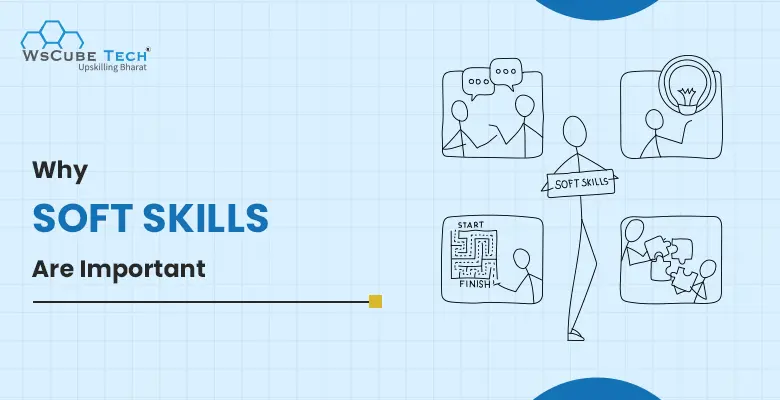There is no stage of life where we don’t need effective soft skills. Whether you are doing a job, appearing for an interview, communicating with clients, working as an entrepreneur, or even meeting new people, the importance of soft skills can’t be ignored.
Unlike hard skills, which define your technical abilities, soft skills are your human, personal, and social abilities and directly relate to your emotional intelligence. It is both your know-how-to-be and Savoir-Vivre, as these represent your way of communicating with others and are far more critical in work than you may believe.

In this write-up, let’s understand why soft skills are important in all aspects of life, especially in the workplace or professional life.
Upskill Yourself With Live Training
Soft Skills vs Hard Skills: What’s The Difference?
Before knowing soft skills’ importance, let’s first know what differentiates these from hard skills.
Recognizing various skills and how they affect the recruiting process is critical. One difference between hard and soft skills is how these are acquired and applied.
- Hard skills are job-specific technical abilities acquired through practice and education. These assist recruiters in finding the ideal candidate with the necessary knowledge and qualities. For example, you can do a content writing course to acquire the right skills required to become a content writer. It will be a hard skill.
- Soft skills are interpersonal characteristics that define your workplace behavior. These aspects of your personality help the recruiter determine whether you are a good fit for their company.
- Soft skills are built and part of your personality and nature, whereas hard skills can be developed through education and experience.
- Years of experience, certifications, technical knowledge, portfolios, and skill tests are all ways to demonstrate hard skills. Soft skills can be seen in your behavior, habits, and verbal and nonverbal communication.
Both hard and soft skills are essential because hard skills prepare you for the job, while soft skills allow you to do your job efficiently. Therefore, the right combination of these skills on your resume is the ideal recipe for getting hired.
Must Read: How to Find Jobs on LinkedIn? Top 10 Easiest Ways
What is The Importance of Soft Skills in Professional Life & Workplace?
Soft skills are essential to improving one’s ability to work with others and can help you advance your career. In addition, soft skills can help you find, attract, and retain clients if you own a small business or work for yourself.
Presentation skills, networking abilities, and etiquette awareness can help you gain new clients and more work from existing clients.

In addition, honing your skills in conflict resolution, problem-solving, and providing excellent customer service can lead to stronger relationships with colleagues, vendors, and other professional contacts. Finally, solid and soft skills can help you gain confidence, which is a valuable asset in business.
However, a lack of soft skills could limit your potential or cause your business to collapse. Work on developing excellent leadership, teamwork, and communication skills.
You may run projects more efficiently, produce results that satisfy everyone, and even favorably influence your own life by enhancing your interactions with others.
Seven reasons why soft skills are important in professional life & workplace :
Here are seven reasons why soft skills are important in professional life & workplace
1. Soft Skills Aid in Decision Making
CEOs and managers are tasked with making critical decisions that affect the entire firm. As a result, their choices are strongly tied to their listening abilities.
Unfortunately, many leaders fail to lead because they lack practical listening skills and make decisions without adequately researching their organization’s current demands.
However, strong listening abilities are not limited to senior executives. Team managers should also employ active listening to guarantee that new ideas are given the necessary voice and that each team member feels heard.

2. Drive Positive Change
Miscommunication can cause confusion and significant loss to your organization, resulting in inefficiency. Therefore, an excellent communication channel is required for workplace efficiency. This communication should occur inside the team and between departments to maintain goal alignment.
Clear communication can assist your organization in achieving goal alignment across various work units. In addition, employees are made aware of the business’s concerns, and they may be able to give inventive solutions to these problems, resulting in positive transformation.
3. Contribute to a Healthy Workplace
While listening and communicating are necessary for leading a workforce, empathizing with your employees’ difficulties is also essential. Empathy fosters a friendly and positive work atmosphere while removing toxic competitiveness. As a result, employees are more willing to take risks and advance in this setting.
Employees feel more empowered to speak up in a workplace that values empathy and are more likely to feel empowered to deliver honest criticism to the organization. These insights help optimize procedures and identify additional operational efficiencies.
Suggested Reading: Why Learn Digital Marketing? Benefits, Career, Salary
4. Solve Problems More Effectively
Developing soft skills like communication and listening will make employees more proactive in identifying difficulties and roadblocks to their goals. Furthermore, they will discover issues and apply appropriate answers or adjustments.
5. Improve Customer Experience
Your staff will actively listen, effectively identify problems, and build solutions based on your customers’ needs if they have soft skills. In addition, they will be more compassionate and empathic while dealing with your customers’ difficulties, improving your customer service.
6. Boost Sales
Soft skills development for your employees will benefit your sales team during the negotiation process. Employees can use competency to interact personally with consumers without violating the professional code of conduct.
Employees with solid communication skills can connect with customers and share their concerns. Because of this situation, your workers will match the proper solution for them, improving your sales.

7. Improve Employee Retention
When you start worrying about improving your employees’ soft skills, your organization’s retention rate rises. Your employees will see that you care about their professional development, and they will decide to support you.
Top Benefits of Soft Skills for Employees
During a job interview, soft skills may make or break you. Indeed, your career and certificates are significant. Nevertheless, employers are increasingly interested in soft skills, and a candidate with fewer qualifications but many soft skills may be favored over a more qualified individual.
Soft skills are vital since they will help determine whether you are a team player who can develop good relationships with your teammates and clients. They also reveal your ability to change and adapt. It will determine whether a corporation is interested in betting on your application rather than another.
Your soft skills represent all of your knowledge, which might be decisive for an interview or your job. A soft skills master will have an easier time securing a position and maintaining a positive relationship with his firm over time.

Suggested Reading: Top 78 Content Writing Interview Questions and Answers For Freshers & Experienced
The following are the advantages of soft skills :
- Increased productivity
- Improved customer service
- Increased self-confidence
- Increased retention rates
- Improved job satisfaction
- Increased loyalty from customers
- Improved team dynamics
- Greater ability to adapt

Most Asked Interview Questions on Soft Skills
- Can you discuss a time when you had to manage your team through a difficult situation?
- How do you prioritize your tasks when you have multiple work deadlines to meet?
- What was the most prominent issue you could resolve at work?
- How do you introduce new topics to coworkers who are unfamiliar with them?
- Describe a circumstance in which the consequences were unexpected. How did you deal with the change?
- What will you do if your staff disagrees with your decision?
- Name three critical factors to consider when working for a company.
- Describe a case in which you had to decide without management’s guidance. How did you address the situation, and with whom did you speak?
- When was the time you could complete a task that required no prior knowledge?
- Describe your most significant professional failure. What exactly did you learn from this experience?
Free Courses for You
| Course Name | Course Name |
| Google Tag Manager Course | Affiliate Marketing Course |
| Semrush Course | Video Editing Course |
| Blogging Course | Email Marketing Course |
| Shopify Course | Photoshop Course |
FAQs Related to Soft Skills Importance
Employers test your soft skills during interviews to recruit someone who can adjust to various scenarios. Showcasing your talents emphasizes how you behaved to reach your objectives in previous employment.
Communication is the most important soft skill.
All soft skills play a vital role. But, communication skills, teamwork, and a growth mindset are the most valued by employers.
While most people have fixed soft skills, these behaviors can be taught. If you know you’re weak in one or more areas, working on yourself before you seek a new job can help you stand out among the pool of candidates.
The soft skills examples include:
Communication
Teamwork
Leadership
Problem-solving
Emotional Intelligence
Team Player Attitude
Growth Mindset
Openness to Feedback
Adaptability
Active Listening
Work Ethic
The list of soft skills for employees is as follows:
Time management
Communication
Adaptability
Problem-solving
Teamwork
Creativity
Leadership
Interpersonal skills
Work ethic
Attention to detail
Read more blogs:



